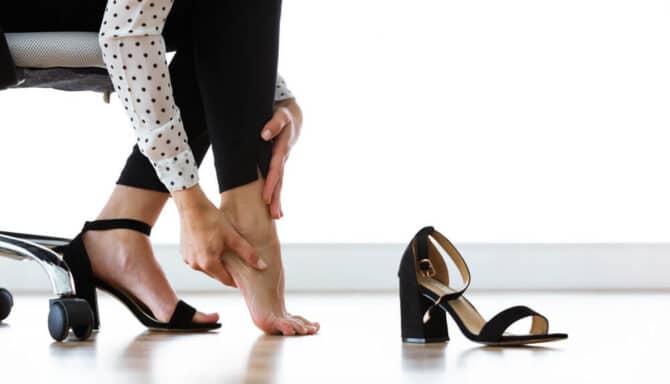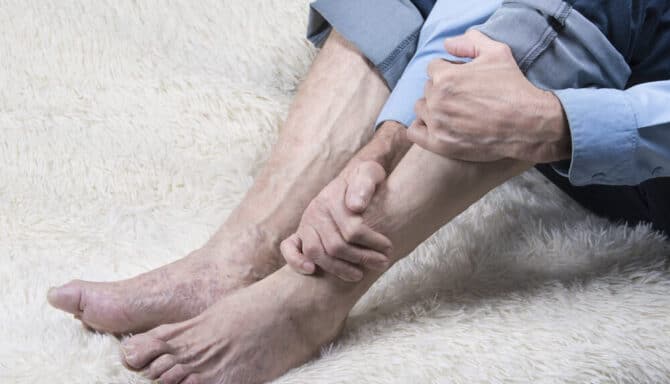June 12, 2025
When we talk about healthy habits, we often focus on nutrition, mental health, or overall fitness. But what about your feet? These often-overlooked heroes carry you through life — and they deserve some attention, too.
Incorporating a few gentle foot mobility drills into your morning routine can help improve flexibility, reduce stiffness, and set you up for a pain-free day. Let’s explore a few simple daily foot exercises that support longevity and mobility, all in under 10 minutes.
Why Morning Foot Rituals Matter
After a night of rest, it’s normal for your feet to feel stiff or tight. That’s because circulation slows down when we sleep, and our muscles and joints aren’t being used. A quick morning routine for foot health helps:
Improve blood flow
Gently wake up foot muscles
Prevent long-term issues like plantar fasciitis or joint stiffness
Support better balance and stability throughout the day
Plus, it feels great — and your feet will thank you!
Your 5-Minute Morning Routine for Foot Health
These beginner-friendly exercises can be done from your bed, the bathroom counter, or even while you’re waiting for your coffee to brew.
1. Toe Spreads (1 minute)
https://youtube.com/shorts/gOwgyrmU6hM?feature=shared
Sit or stand comfortably. Spread your toes apart as wide as you can, then release. Repeat 10–15 times.Why it helps: Improves foot strength and activates the smaller intrinsic foot muscles that support balance.
2. Ankle Circles (1 minute per foot)
https://youtu.be/qaatVpZy2ek?feature=shared
Lift one foot off the ground and gently rotate your ankle clockwise 10 times, then counter-clockwise 10 times. Switch feet.Why it helps: Promotes circulation and joint mobility to counteract morning stiffness.
3. Towel Curls (1–2 minutes)
https://youtu.be/toqnSys_JRw?feature=shared
Place a small towel on the floor and try to scrunch it toward you using just your toes.Why it helps: Strengthens the arches and enhances coordination in the foot muscles.
4. Calf Stretch with Wall or Step (1–2 minutes)
https://youtu.be/utLavyPDnqI?feature=shared
Stand with your hands on a wall or place your toes on a step while your heel stays on the ground. Lean forward until you feel a stretch in your calf and Achilles tendon. Hold for 20–30 seconds per leg.Why it helps: Loosens up the back of the leg and heel — essential for preventing plantar fasciitis and Achilles tendonitis.
Bonus: Gentle Foot Massage
https://youtu.be/BwhGFoHDkUI?feature=shared
Before putting on your socks or shoes, use your thumbs or a massage ball to roll out the soles of your feet. Focus on tight spots in the arch and heel. Just 1–2 minutes can make a big difference.
Foot Mobility Drills = Long-Term Foot Wellness
Incorporating these foot mobility drills into your morning can support not just your feet, but your entire body. Improved foot function leads to better posture, less knee and hip pain, and more stability with every step you take.
And remember — consistency is key. Like any good habit, the benefits of daily foot exercises build up over time.
Feature Photo by Aljona Ovtšinnikova
May 15, 2025
Gut Inflammation and Foot Pain – What’s the Link?
Foot pain is often blamed on overuse or injury—but new research highlights a less obvious cause: gut health. Specifically, gut inflammation and foot pain are more connected than you might expect. When the gut lining becomes compromised, harmful particles can leak into the bloodstream, triggering systemic inflammation.
This inflammation may impact muscles, joints, and soft tissues—especially in the feet, where stress is frequent.
Systemic Inflammation and Plantar Fasciitis
One of the most common causes of heel pain, plantar fasciitis, is already driven by inflammation. But when systemic inflammation is present due to poor gut health, it can make symptoms worse and recovery slower.
People with inflammatory diseases like rheumatoid arthritis or inflammatory bowel disease often experience foot pain, suggesting a deeper, whole-body link. Reducing systemic inflammation through gut care may provide relief for conditions like plantar fasciitis.
Gut Microbiome and Joint Health in the Feet
The gut microbiome—the complex ecosystem of bacteria in your digestive tract—plays a critical role in regulating inflammation and immune response. When the microbiome is imbalanced (a condition known as dysbiosis), inflammation can increase, affecting joint health across the body, including in the feet and ankles.
Emerging studies show a strong connection between gut microbiome and joint health, indicating that good gut bacteria may help reduce chronic foot pain linked to inflammation.
Nutrient Absorption: A Key to Musculoskeletal Foot Health
Beyond inflammation, poor gut health also affects how your body absorbs nutrients, such as:
Vitamin D
Magnesium
Omega-3 fatty acids
These nutrients are essential for maintaining strong bones, muscles, and connective tissues. A gut that’s not absorbing nutrients efficiently could contribute to foot fatigue, pain, or slow injury recovery.
How to Support Gut Health for Better Foot Health
If you're dealing with persistent foot pain—especially conditions like plantar fasciitis—supporting your gut could be a game changer. Here are some steps to consider:
Adopt an anti-inflammatory diet: Reduce processed foods, sugar, and excess alcohol.
Add probiotics and fiber: These help maintain a balanced gut microbiome.
Stay hydrated and active: Movement supports both gut motility and foot health.
Get tested: A healthcare provider can check for nutrient deficiencies or inflammatory markers.
By improving your gut health, you may also be reducing the underlying inflammation contributing to your foot issues.
When to See a Chiropodist
Foot pain shouldn’t be ignored. If your discomfort persists despite footwear changes or home remedies, a professional assessment is key. At Feet First Clinic, we look at the bigger picture—including possible systemic factors like gut health that may be influencing your pain.
Final Thoughts on Gut Health and Foot Pain
The body is more interconnected than we often realize. Research on gut inflammation and foot pain, systemic inflammation and plantar fasciitis, and the gut microbiome’s role in joint health is still growing—but one thing is clear: taking care of your gut may help your feet feel better too.
Featured Photo by Sora Shimazaki
March 27, 2025
Tight calves and foot health go hand in hand (or should we say foot in foot?). Our body parts are intricately connected, meaning discomfort in one area can lead to issues elsewhere. Likewise, muscle strain and fatigue in the lower legs can wreak havoc on the feet and other body parts if ignored for too long. Let’s explore the symptoms and causes of tight calves, how tight calves affect the body and feet, and how a chiropodist or podiatrist can help you manage pain.
Tight Calves: What Are They?
"Tight calves" is a general term describing the sensation of stiffness, pain and tension in the muscles at the back of the lower leg, often leading to restricted movement that affects your daily life. This tightness can manifest as muscle pain and stiffness when walking, balance issues, and more. Tight calves and posture even have a connection!
Anatomy of the Calf Muscles
The calf comprises two primary muscles:
Gastrocnemius: The primary or chief muscle in the calf. It’s located on the back of your leg, relatively close to the skin’s surface. This superficial muscle has two heads, medial and lateral. It helps flex the knee and foot, and also plays a crucial role in walking and posture.
Soleus: Located beneath the gastrocnemius, this wide and flat muscle is deeper, and originates from the posterior tibia while connecting to the Achilles tendon above the heel. This group helps stabilize ankle during activities like walking and running.
Understanding the structure and function of these may be helpful in determining the cause of calf muscle tension.
What Causes Calf Pain?
Pain in the lower part of the back of the legs does not always feel the same. It may come on suddenly, or nag at you all day by way of a mild, dull ache. The former is often the result of a sudden injury or sharp movement, whereas the latter can build over time, resulting from lifestyle choices like wearing unsupportive shoes or working out too hard.
Here are some common causes of calf pain:
Muscle Cramps. Sudden, involuntary contractions of the calf muscles, known as cramps, can cause significant tightness and discomfort. These cramps may result from factors such as dehydration, general muscle fatigue, or electrolyte imbalances.
Overuse. Engaging in repetitive activities that involve a lot of running or jumping can overwork the calf muscles and make them feel tight. This is especially common when increasing training intensity or duration without allowing yourself to rest.
Muscle Strain. Overstretching or tearing the calf muscles, often due to sudden movements or excessive force, can result in tightness, pain, and swelling.
Non-supportive and Ill-fitting Footwear. Shoes lacking arch support, shock absorption, or cushioning force the muscles to work harder with every step. Without proper arch support, the foot may put excessive strain on the calf muscles as they attempt to stabilize the lower leg. A lack of shock absorption further increases the impact of the ground on the feet and legs. Similarly, insufficient cushioning fails to distribute pressure evenly, leading to increased stress on the calves, especially during prolonged standing or walking.
Poor Ankle Mobility. Limited flexibility in the ankle joint can place additional strain on the calf muscles, contributing to tightness. Some causes include having a history of ankle injuries or arthritis.
Pre-existing Gait Abnormalities and Foot Type. Overpronation (excessive inward foot rolling — common in flat feet) or underpronation (excessive outward foot rolling — common with high arches), can lead to calf muscle tightness due to altered mechanics and increased strain.
Dehydration and Mineral Deficiencies. Lack of adequate fluids or essential minerals like potassium, magnesium, and calcium can lead to muscle cramps and tightness in the calves.
Inactivity. Prolonged periods of inactivity or sedentary behavior can cause the calf muscles to become tight due to lack of regular movement and stretching.
Venous Insufficiency. Conditions like deep vein thrombosis (DVT) or varicose veins can cause calf tightness, as well as general venous insufficiency.
How Tight Calves Affect the Body and Feet
We can feel the effects of tight calf muscles in more ways than one. Our feet can become weaker, more vulnerable and fatigued, sometimes leading to a foot condition we didn’t have before. Tight calves can also cause experience mysterious back and knee pain. Here are common additional problems can arise from strain in the lower legs.
Joint Pain
Tight calves can have a significant impact on the body's overall alignment, posture and movement, often leading to joint pain in the knees, back, and feet.
When the calf muscles are tight, they restrict proper ankle dorsiflexion (raising the foot upwards towards the shin). When ankle mobility is restricted, the body may lean forward slightly to maintain balance, causing strain on the lower back muscles and leading to chronic discomfort. This abnormality can put excessive strain on other joints, like in the knees. This perfect storm of joint problems and limited movement can contribute to conditions like osteoarthritis over time.
Biomechanical Foot Conditions
The feet often bear the brunt of tight calf muscles, as they have to absorb additional stress during movement. Calf pain can cause a disrupt our running or walking gait as we try to move through the pain. Further, since our calf muscles connect our knees to our ankles, when the calves become tight it puts strain on the ankle. This disrupts our foot mechanics and can cause painful, chronic overuse injuries like plantar fasciitis and Achilles tendonitis. In fact, tight calves is one of the leading contributing factors to Achilles tendonitis and plantar fasciitis.
Increased Risk of Injury
Aching, tense muscles are more susceptible to further strains and tears, in addition to also causing balance problems as you struggle with pain. All of this combined can be a recipe for disaster and lead to a slip or fall (especially in seniors) that may cause even more damage, like a broken bone. Tight calf muscles can also contribute to more mild conditions like shin splints (repetitive stress on the shin bone) and generally hinder athletic performance.
Circulatory Problems
The calf muscles assist in pumping blood back to the heart from the lower extremities. Tightness in these muscles can impede this process, resulting in swelling in the feet and ankles and, in severe cases, contributing to circulatory problems.
How to Treat Tight Calves: Muscle Tightness and Foot Care
https://www.youtube.com/shorts/sNdIAxZNOn8
A foot care professional can help with calf tightness and pain. With their guidance and your determination to improve your foot and leg health, you can live and move comfortably. Let’s explore some options.
Compression Stockings
Wearing medical-grade compression stockings can improve circulation in the lower legs, reducing muscle fatigue and tightness and giving your lower extremities a healthy, comforting and energizing boost.
They work by applying gentle pressure to the legs, which helps prevent blood pooling and promotes better oxygen delivery to the muscles. Compression therapy is especially useful for individuals who spend long hours on their feet, live a sedentary lifestyle, spend prolonged periods sitting while travelling, pregnant women, or those with conditions like varicose veins. A physician can determine the right level of compression based on your specific needs.
Custom Orthotics
Custom orthotics can help address underlying biomechanical issues that contribute to tight calves. A chiropodist can assess foot structure to design orthotics that conform to your feet, and yours alone, providing tailored support and alignment for your unique needs.
By correcting imbalances and reducing strain on the lower leg muscles, orthotics can help alleviate tightness and prevent further discomfort. These devices can be particularly beneficial for individuals with flat feet, high arches, or abnormal gait patterns that place excessive stress on the calves.
Proper Footwear
Shoes with adequate arch support, cushioning, and shock absorption that redistributes pressure away from the heel can help keep your feet comfortable, maintain proper lower limb alignment and reduce strain on the calf muscles. Chiropodists and podiatrists often advise against wearing unsupportive footwear like flip-flops or high heels for prolonged periods, as they can contribute to muscle tightness and discomfort in the calves and feet.
Strengthening Exercises and Stretching Programs
A structured exercise program focusing on calf flexibility and strength can significantly reduce tightness. Chiropodists can recommend targeted stretches that target the gastrocnemius and soleus muscles — helping improve range of motion in the lower leg and fighting off stiffness.
Calf raises in particular (see demonstration below) can enhance muscle endurance and prevent recurring tightness. Incorporating these exercises into a daily routine can improve mobility and reduce the likelihood of calf-related discomfort.
Some other good examples of stretches for calf muscles include the Soleus Stretch and Heel Stands. Click the links for Feet First Clinic demonstrations!
https://www.youtube.com/shorts/ZVSfzY6so8w
January 9, 2025
Living with high arches can be a challenge, but if you pay attention to your foot health, you can manage them effectively. Let’s explore what high arches are, their impact, and our top 4 tips for living with high arches.
What Are High Arches?
https://www.youtube.com/shorts/13rmyA18ZzY
High arches (pes cavus) is a condition where one has - you guessed it - abnormally high foot arches. They are essentially the opposite of flat feet, which are characterized by having a minimal or non-existent arch. High arches may be hereditary or caused by neurological disorders such as Charcot-Marie-Tooth disease.
From a biomechanical perspective, the raised arch reduces the surface area in contact with the ground, which can result in an uneven distribution of weight across the foot. High arches often place excessive pressure on the ball and heel of the foot, leading to discomfort, instability, potential injuries and chronic foot conditions. High arches also impairs shock absorption, which causes progressive wear-and-tear on the joints over time.
Side effects of high arches include foot pain, issues like calluses and hammertoes, and an increased risk of ankle sprains. Individuals can also develop conditions like plantar fasciitis (this can also frequently occur in people with flat feet), or Achilles tendonitis due to the strain placed on the muscles and ligaments. The lack of shock absorption can also reverberate up the body and lead to joint disorders like arthritis.
High arches are associated with supination, also called underpronation, a condition where the foot rolls outward during movement. This gait pattern places additional stress on the outer edges of the foot and ankle, leading to instability and overuse injuries. Consequently, individuals with high arches should pay close attention to their walking or running patterns to prevent long-term complications.
High arches can also lead to changes in posture and gait. This, combined with the lack of shock absorption, may result in secondary issues such as knee, hip, or back pain over time.
Tips for Living with High Arches
https://www.youtube.com/shorts/2et0ZUSx4OM
Living with high arches requires thoughtful adjustments to your daily routine and habits. Here are some ways to keep your feet comfortable and supported:
1. Choose the Right Footwear
Proper footwear is essential for managing high arches. Opt for shoes with ample shock absorption, arch support and cushioning. Shoes with flexible midsoles or rocker soles can also be very helpful: People with high arches tend to have rigidity in the toes and ankles due to joint wear-and-tear, which means the toes and ankles do not flex as much as it should during the gait cycle. A flexible midsole and rocker sole counteracts this and make movement easier. Likewise, people with high arches should avoid high heels, rigid soles, and unsupportive flats, which can exacerbate discomfort.
Due to supination, people should look for cushioning running shoes. These provide balanced cushioning and plenty of shock absorption and flexibility to support the foot’s natural motion and healthy biomechanics. This design helps distribute pressure evenly, enhances comfort, and reduces the risk of injury.
2. Wear Custom Orthotics
Custom orthotics are a valuable tool for redistributing pressure evenly across the foot. You can work with a specialist, like a podiatrist or chiropodist, at a foot clinic to create orthotics tailored to your specific needs.
Scientifically, custom orthotics help correct abnormal biomechanics, such as excessive supination, by stabilizing the foot and encouraging a more neutral gait. They can also provide added cushioning to reduce the impact of your stride on your joints. Over time, this can alleviate pain, reduce fatigue, and prevent the development of secondary issues in the knees, hips, or lower back.
3. Maintain a High Arch Foot Care Routine
Foot baths and massages can soothe foot pain, relax the muscles in your feet and boost blood circulation.
Soak your feet in warm water with Epsom salts, or foot bath products from reputable companies like Gehwol, to alleviate tension. Gehwol products, such as their Herbal Foot Bath, are available to buy at our Toronto foot clinic, Feet First Clinic!
Gently massage the arch, heel, and toes to improve circulation and relieve tightness. Read this article to learn how to give yourself a foot massage from home.
4. Try Stretching and Strengthening Exercises
Foot stretches and exercises play a crucial role in managing high arches by improving flexibility, reducing muscle tightness, and promoting better blood circulation in the feet. High arches can lead to stiffness and imbalances in the tendons and muscles, increasing the risk of discomfort and injury. Over time, these stretches can support better alignment and strengthen the foot's ability to handle daily stress, making them an essential part of high arch foot care.
Here are some simple routines you can try today!
Toe Flex and Raise: While standing, plant your toes and lift your heels off the ground. Hold for 15-30 seconds and repeat 5 times.
Seated Towel Stretch: Loop a towel around your foot and gently pull it toward you, holding for 15-30 seconds.
Pen Pick-ups: Stay seated. Then, lay three pens, or similarly shaped objects, in front of you–spaced apart evenly. Using your toes, pick up each pen and place it in a bowl.
Seated Toe Pulls: Sit on a chair and cross one ankle over the opposite knee. Grab the top of your foot and gently pull it toward your body until you feel a stretch on the top of your foot. Hold for 15-30 seconds and repeat 2-3 times per foot.
https://www.youtube.com/shorts/-EeyHTdkrEs
Additional High Arch Pain Relief Tips
More practical approaches for high arch pain relief include:
Ice Therapy: Apply an ice pack to sore areas for 15-20 minutes to reduce inflammation and soothe discomfort. If your feet are particularly painful, take this one step further by practicing the RICE method (Rest, Ice, Compression and Elevation).
Supportive Inserts: Use over-the-counter insoles with firm arch support. A good choice for high arches is the Superfeet Green or the Superfeet Run Cushion High Arch insoles. However, talk to a podiatrist or chiropodist about if you need more customized support from orthotics.
Medication: Nonsteroidal anti-inflammatory drugs (NSAIDs) may help manage pain.
Seek Professional Help: Visit a podiatrist or chiropodist for a biomechanical assessment to determine how prominent your high arches are, how they are affecting your body, and any contributing biomechanical factors. These foot specialists can also fit you for custom orthotics, provide shoe recommendations and curate a full treatment plan.
When to See a Specialist For High Arches
If high arches are causing persistent discomfort or limiting your mobility, it’s essential to seek professional advice. As we mentioned, visiting a foot clinic ensures access to personalized treatment plans. Consulting a foot specialist is especially important if you notice:
Increased frequency of ankle instability or sprains.
Development of deformities like hammertoes, claw toes, or bunions.
Chronic pain that makes simple activities like walking increasingly difficult.
A foot specialist can recommend the appropriate treatments, depending on the severity of your condition. They may also suggest physical therapy to improve balance, coordination, and overall foot function.
Regular check-ups and assessments with a podiatrist or chiropodist can prevent seemingly minor issues from becoming major concerns. Don’t hesitate to seek their expertise!
https://www.youtube.com/shorts/XZUfVhny5pY
January 9, 2025
When it comes to health, foot care sometimes takes a backseat for men. However, neglecting this vital part of the body can lead to foot pain, skin and nail problems, reduced mobility, and more serious issues over time. Some foot conditions commonly seen in men are influenced by lifestyle, footwear choices, or other risk factors. That's why prioritizing men's foot health is essential for maintaining an active, pain-free life. In this article, we’ll explore three foot conditions that can disproportionately affect men, and discuss the best ways to treat them.
Foot Conditions That Target Men
Gout
Achilles tendinitis
Toenail conditions
Additional foot conditions in men
Gout
https://www.youtube.com/watch?v=2lQDihccUBg
What is Gout?
Gout is a type of arthritis caused by the accumulation of uric acid crystals in joints. Uric acid is a byproduct formed during the breakdown of purines, which are naturally found in the body and certain foods (e.g., red meat, seafood, and alcohol). Normally, uric acid is dissolved in the blood and excreted through urine. However, when the body produces too much uric acid or fails to excrete it efficiently, it can lead to hyperuricemia (high levels of uric acid in the blood).
When uric acid levels exceed the threshold of solubility, needle-shaped urate crystals can form and deposit in the joints. This triggers the immune system and causes the painful inflammatory response characteristic of gout.
Gout symptoms generally come in the form of severe and sudden flare ups ("gout attacks") that come and go, rather than a consistent, nagging pain like other conditions. It often feels like your big toe is hot or “on fire”. The pain can even signal your body to wake up from a deep sleep. Gout attacks cause swelling, redness, intense joint pain and affected mobility. While usually affecting the feet (typically starting in the big toe), it might also spread to other joints like the fingers, elbows, wrists, knees and ankles.
Gout affects men more than women primarily because men naturally have higher levels of uric acid, which is the root cause of the condition. Estrogen, a hormone predominant in women before menopause, helps the kidneys excrete uric acid more efficiently. This offers women a protective advantage until estrogen levels decline after menopause. As a result, men can develop it at any stage of their lives, while women typically experience it post-menopause.
How to Treat Gout?
Gout is a metabolic disorder, and is managed through a combination of treatments and lifestyle modifications:
Medication: Medications that reduce uric acid levels are often required to manage gout. These can be prescribed by your family doctor or rheumatologist. Medications like NSAIDs and corticosteroids can also help reduce symptoms by reducing inflammation.
Exercise and Physical Activity: Recurrent gout attacks weaken and damage the joints over time. The best way to counteract this is to strengthen and condition the joints with a consistent fitness regimen. Not only will this help curtail progressive joint damage, stronger joints and muscles allows the body to better withstand our regular activities. This reduces joint strain, which interrupts the inflammatory response that triggers gout attacks in the first place.
Diet: It is a myth that diet alone will cause gout. However, a healthy balanced diet with foods that are low in purines can help curb gout attacks. Some of the best foods to eat include poultry and eggs, nuts and legumes and leafy greens. It's important to avoid foods that contain high fructose corn syrup (i.e.: cola), red meat and other rich foods high in purines.
Orthotics & Footwear: A chiropodist or podiatrist can help manage the joint damage caused by gout by recommending supportive footwear and prescribing custom orthotics. These treatments will address any biomechanical factors causing excess strain and pressure on the affected joints; this will in turn reduce the joint inflammation that can trigger gout attacks.
Achilles Tendinitis
https://www.youtube.com/shorts/utLavyPDnqI
What is Achilles Tendonitis?
Achilles tendinitis is an overuse injury characterized by inflammation of the Achilles tendon, the thick band of tissue that connects the calf muscles to the heel bone. This tendon facilitates walking, running, and jumping by transmitting force from the calf muscles to the foot. Achilles tendinitis develops when the tendon experiences repetitive stress, microtears, and inadequate recovery, leading to localized inflammation, pain, and stiffness. The condition often arises from activities that involve sudden increases in intensity, duration, or frequency, such as running or jumping sports. It can also be caused or contributed to by weak, tight calf muscles.
Research suggests that Achilles tendinitis may be more common in men, particularly those over 30 years old. This is because male recreational runners and athletes tend to burden the tendon with a greater load than their female counterparts. Men sometimes also have less flexibility in their calf muscles than women, which increases the strain on the Achilles during physical activity. Hormonal differences also play a role, as estrogen in women may provide some protective effects by enhancing tendon elasticity and reducing stiffness.
How to Treat Achilles Tendonitis?
Treatment for Achilles tendinitis includes strengthening the tendon and surrounding muscles by performing foot exercises and stretches, particularly ones that work the calf muscles.
Shockwave therapy from a podiatrist or chiropodist at a foot clinic might also be an option for you. This is a non-invasive treatment that stimulates healing in soft tissues via high frequency sound waves from a special applicator.
Speaking of foot clinics, another great way to manage Achilles tendinitis and prevent it from occurring again is getting fitted for custom orthotics by a foot care professional. You can also try high quality over-the-counter insoles from brands like Superfeet. Athletes and runners should also always wear supportive footwear that provides adequate shock absorption and arch support.
Toenail Conditions
https://www.youtube.com/shorts/Z6VYvI6CJQs
Some men may be less likely to care for their toenails than women are. This leaves them more vulnerable to issues like ingrown toenails, cracked toenails or even toenail fungus. Men may also be less likely to receive treatments like medical pedicures, a comprehensive service performed by a chiropodist or podiatrist that not only cleans and trims the nails, but can be a great way to spot potential toenail issues.
Neglecting regular trimming, cleaning, and moisturizing of the nails creates an environment where these problems can thrive, particularly when combined with factors like wearing tight or non-breathable footwear, engaging in strenuous physical activities, or ignoring early signs of discomfort. Therefore, regular nail care, including proper trimming techniques and maintaining foot hygiene, is essential for preventing these common nail issues.
As far as toenail fungus goes, some men are more likely to spend time in areas where these contagious fungi thrive, like public showers, locker rooms and pools. It’s critical to wear protective footwear in these spaces, or avoid them entirely as much as you can. If you notice toenail fungus starting to grow under the nail (by way of thickened, brittle greenish-yellow toenails), you should seek treatment from a chiropodist or podiatrist right away, as most over-the-counter anti-fungal products from drug stores won’t work.
Additional Foot Conditions That Affect Men
https://www.youtube.com/shorts/VqEeU4Hrh3I
Plantar Fasciitis
Plantar fasciitis is a condition caused by inflammation of the plantar fascia, a thick band of connective tissue that supports the arch of the foot and absorbs shock during movement. Overuse, prolonged standing, having flat feet or high-impact activities can lead to inflammation, triggering pain and stiffness, particularly near the heel. Men may be more susceptible to plantar fasciitis due to higher body weight, which increases strain on the plantar fascia. Greater participation in high-impact sports and physically demanding jobs that involve repetitive stress on the feet can also put men more at risk for plantar fasciitis. That said, plantar fascitiis is simply a very common condition that can target anyone. Treatment typically involves rest, stretching exercises for the calf and foot, and wearing supportive footwear and orthotics. Severe cases may benefit from physical therapy and anti-inflammatory medications.
Foot Odour
Foot odour, or bromodosis, occurs when sweat from the feet interacts with bacteria on the skin, producing a noticeable smell. The feet contain more sweat glands per square centimetre than any other part of the body, making them particularly prone to excessive sweating. Men may experience foot odour more frequently than women due to higher sweat production, more time spent in closed footwear, and less attention to foot hygiene. Prevention and treatment involve washing the feet daily, thoroughly drying them, and wearing moisture-wicking socks and breathable shoes. Deodorizing powders and sprays, as well as foot soaks can also help minimize bacterial growth and odour. We suggest trying these products from Gehwol, a reputable brand available to purchase at our Toronto foot clinic!
https://www.youtube.com/shorts/TW9L0UMjLOw
January 2, 2025
One of the best ways to prevent foot pain in your kids is to encourage them to try kid-friendly foot exercises. Children are constantly growing and doing physical activities, so it's important for them to do exercises that help strengthen their muscles, improve flexibility, soothe pain and enhance coordination. Today’s article will teach you how to select the right exercises for your little ones, and give five examples they can try.
How to Keep Foot Stretches Safe for Kids
It's important to ensure that the exercises are safe, effective, and appropriate for their age and development stage. Here are a few key factors to look out for:
Gentle and controlled movements: Stretches should never cause pain— which is also true for adults. Feeling “the burn” or feeling the stretch work in the appropriate area is very different from feeling pain. Furthermore, kid-friendly stretches should involve slow, controlled movements. If a stretch feels too intense or painful, it should be stopped. Kids' muscles and tendons are still developing, so overstretching can lead to injury.
Age-appropriate: The stretch should be suitable for the child's age and physical development. For example, a 4-year-old might not perform the same exercises as a 12-year-old.
Supervision: Parents should play an active, observant role in their children’s foot health. Always supervise during foot stretches to ensure they’re performing them correctly and safely. Guide them through the stretch, making sure they aren’t twisting or forcing their bodies into unnatural positions.
Short and frequent sessions: Kids typically benefit from shorter stretching sessions, as their attention spans are limited and their muscles can become fatigued quickly.
Consult a foot specialist: A foot care professional, like a chiropodist or podiatrist at a foot clinic can explain what type of stretches and exercises your child will benefit from the most. Booking a foot assessment for your kids is a great first step!
Top 5 Kid-Friendly Foot Exercises
Pen pick-ups
Frozen water bottle rolls
Seated hamstring stretch
Calf stretches
Flat feet exercises
Pen Pick-Ups
https://www.youtube.com/shorts/5PCZuM5E6RU
A good stretching tip for kids’ feet is to make stretches as interactive and fun as possible. Pen pick-ups are great foot exercises for children as it allows them to focus on a task, which will hopefully keep them from getting restless or distracted. They will love the challenge of picking up every single pen and putting them in the bowl - proudly accomplishing their goal while simultaneously taking care of their foot health. You an also do this exercise with objects like marbles and lego (which could serve the dual-purpose of strengthening their feet while getting them to put their toys away!)
This simple exercise strengthens the intrinsic muscles of the foot, which support the arch and contribute to better balance and stability. By taking care of these muscles early, children can reduce the risk of developing common foot issues— ranging from plantar fasciitis, to even arthritis or bunions in their golden years.
Additionally, the exercise promotes coordination and fine motor skills by challenging kids to use their toes in a precise and controlled manner. This activity can also help with flexibility, ensuring that the joints in the toes and feet stay mobile and healthy, which is particularly important for growing children.
How to do it:
Sit on a chair with feet flat on the ground.
Use the toes to pick up pens one at a time. Small objects like pencils or marbles can also work.
Place each pen into a bowl.
Repeat several times for each foot.
Seated Hamstring Stretch
https://www.youtube.com/shorts/AsuUXJYnUmQ
While not specifically a foot exercise, stretching other parts of the body have a positive affect on foot health — everything is connected, from the toes to the head!The seated hamstring stretch is a great option for kids experiencing growing pains. These aches often present as a throbbing sensation in the legs, thighs, or behind the knees. Stretching the hamstrings can help relieve this discomfort, not to mention tight hamstrings are linked to muscle imbalances that may lead to knee or ankle pain in the future.
It’s worth noting that “growing pains” is somewhat of a misnomer. Despite the name, there is no scientific evidence that growth itself causes pain. Instead, these aches are more likely a result of daytime activities that strain muscles, with the discomfort surfacing at night when kids are at rest. This occurs because during growth spurts, bones can grow faster than muscles and tendons, which might cause discomfort.
Hamstring stretches play a key role in alleviating muscle strain associated with growing pains. When kids engage in activities like running, jumping, or climbing, the hamstrings can become overworked and tight. Stretching this muscle group increases flexibility, reduces tension, and improves blood flow, which helps relax the muscles and relieve discomfort. Regular stretching also prevents stiffness, supporting healthy movement and reducing the likelihood of aches caused by muscle fatigue.
How to do it:
Sit on a chair with the back straight.
Extend one leg straight out in front.
Slowly lean forward from the hips, reaching toward the extended leg.
Stop when a stretch is felt in the hamstring.
Hold for 30 seconds and repeat on the other leg.
Make sure your child knows exactly where the hamstring (back of the thigh) so they know when it’s working!
Frozen Water Bottle Rolls
https://www.youtube.com/shorts/eTffGEvK6Z8
Similar to the pen pick-ups, this easy-to-perform exercise is a good option for children as it lets them engage more by incorporating an object with a task.If you don’t have water bottles at home, your child can use golf, tennis or massage balls. They won’t get the same instant soothing effect you get with the frozen element, and ice can be more ideal for muscle strain, but these will still target foot arch pain.
Foot arch pain in kids can arise from a combination of biomechanical stress, growth-related changes, and physical activity demands. As children grow, their foot structure continues to mature, with the arches typically becoming more defined. However, during late childhood and adolescence, factors like growth spurts can create temporary muscle imbalances. As the bones grow rapidly, the surrounding muscles, tendons, and ligaments—especially those in the arch—may struggle to keep up, resulting in tightness and strain. This can be particularly noticeable in active older kids, as their physical activities intensify with sports and other high-impact movements, placing additional stress on the plantar fascia and intrinsic foot muscles.
Biomechanical issues like excessive ovpronation from having flat feet (rolling inward of the foot), or supination (rolling outward) from having high arches can further contribute to arch pain. These movement patterns lead to uneven distribution of weight and abnormal stress on the plantar fascia and Achilles tendon, which can cause inflammation and discomfort. Adolescents who participate in sports like basketball, soccer, or gymnastics may be especially prone to arch pain due to the repetitive jumping, running, and pivoting that challenge the foot's structural stability.
How to do it:
After freezing a water bottle for a few hours, place it on the floor.
While seated or while standing, roll your foot back and forth over the frozen water bottle.
Move your foot side to side to massage different areas.
Continue for a few minutes per foot.
Calf Stretches
https://www.youtube.com/shorts/utLavyPDnqI
Like hamstring stretches, calf stretches are another way to help kids manage aches and pains in the legs. They also benefit foot health by strengthening the Achilles tendon. Targeting the Achilles tendon early improves its flexibility and resilience, reducing the risk of developing Achilles tendonitis later in life, especially for little future athletes. A strong and flexible Achilles tendon adapts better to high-impact activities and repetitive strain.
Kids can develop tight calves due to a combination of biomechanical, developmental, and activity-related factors. Activities like running, jumping, or climbing, heavily engage the calf muscles. Without adequate stretching or recovery, this repetitive strain can lead to chronically tight muscles.
Furthermore, gait abnormalities or alignment issues, such as congenital flat feet, can place additional strain on the calf muscles.
How to do it:
Straight-Leg Stretch
Step one leg forward and bend the front knee.
Keep your back leg straight with the heel pressed into the ground.
Hold the stretch for 30-45 seconds.
Bent-Leg Stretch
From the same position, bend the back knee slightly.
Feel the stretch lower, near the ankle.
Hold for 30-45 seconds.
Arch Lifts
https://www.youtube.com/shorts/whJ3TZAOn00
As we briefly mentioned, most kids have flat feet until around age 7. This exercise is a good option for younger kids between ages 4-6 who will soon start developing a foot arch, as well as kids who continue to have a minimal or non-existent arch.
This exercise helps activate and strengthen the muscles on the outside of the foot, which play a key role in supporting the arch. For younger kids who are beginning to develop their foot arches, the movement encourages the muscles to work in a way that supports natural foot development.
For kids who still have flat feet or minimal arches, this exercise can provide a gentle way to engage the muscles and ligaments that support the arch, potentially improving the structure over time. By focusing on proper alignment and muscle activation, it promotes better foot mechanics for your little one and helps reduce the risk of discomfort or foot-related issues.
How to do it:
Stand with the feet hip-width apart.
Slowly roll your weight onto the outside of your feet.
Keep your toes relaxed and your ankles straight.
Hold for 15 seconds.
Release and repeat 3 times.






